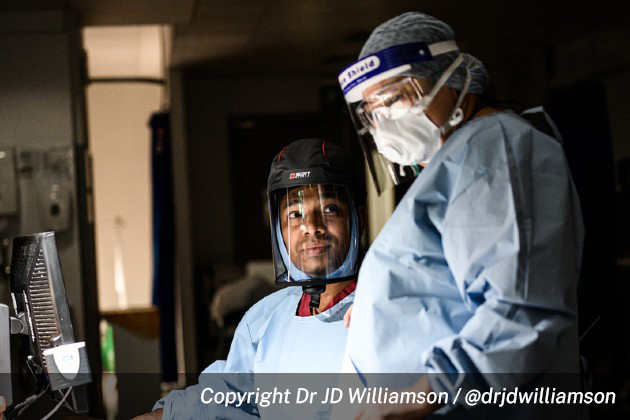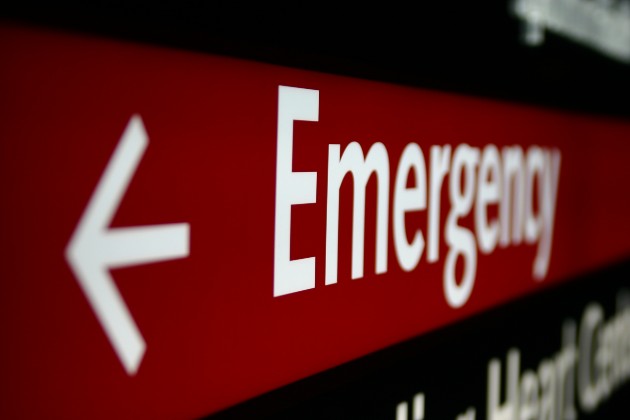In the first week of January, more than 45,000 NHS hospital staff in England were off work each day on average because of COVID-19. This rose to almost 50,000 on some days.
As the Omicron variant ripped through our communities, health care staff in every setting in every part of the UK were again exposed to unprecedented risks.
Two years into the pandemic, the RCN continues to fight for better protection for its members, demanding FFP3 masks be supplied to all staff caring for people with known or suspected COVID-19.
Lack of clarity
National infection prevention and control guidance remains unclear on the issue, failing to acknowledge firm evidence of airborne transmission of the virus.
This is causing confusion for employers and a postcode lottery in the provision of personal protective equipment (PPE), argues RCN Professional Lead for Infection Prevention and Control Rose Gallagher.
“We know health care workers are at increased risk of being infected with COVID-19,” says Rose. “Yet the guidance lacks clarity to support risk assessments. It doesn’t say how COVID-19 is transmitted, neglecting to recognise the airborne route as a significant risk to nursing staff.
Health care workers are at increased risk of being infected with COVID-19
“There is a clear expectation under the Control of Substances Hazardous to Health (COSHH) Regulations 2002 that an employer’s risk assessment takes into account the level, type and duration of exposure to substances hazardous to health, in this case to SARS-CoV-2, which has been classified as a group three biological agent.
"For employers to do this effectively, the route of transmission must be known. Equally, for members making ‘in the moment’ assessments of risk, having clarity on the route of transmission is vital.
“As it stands, the UK guidance is open to interpretation, so these staff are subject to local decisions on what level of protection they should wear. With infection rates so high over the past few months, precautionary use of FFP3 masks would have helped reduce virus transmission at work.”
By contrast, other international agencies such as the European Centre for Disease Prevention and Control (ECDC), have updated their guidance in line with growing evidence about the airborne route of virus spread. The ECDC now recommends the equivalent use of FFP3 masks for any health worker caring for people with known or suspected COVID-19.
Improving understanding
The UK lags behind the European approach, with the lack of national clarity resulting in unequal provision of respiratory protective equipment (RPE) - an avoidable situation we’ve fought hard to influence.
Since new variants of concern were first identified early last year, we’ve held meetings with the health secretary, sent letters to the prime minister, demanded the chief medical officer take action and campaigned jointly with other health unions. The UK government has so far refused to budge.
Not willing to let staff go unprotected, the RCN has changed tack, working with health and safety experts in other organisations to launch a new COVID-19 risk assessment toolkit. It aims to support staff to consider and manage risks associated with COVID-19 and aid local decision making on PPE.
“It’s really important that members understand their employers’ responsibilities in protecting them against the risks of COVID-19,” stresses Rose.
We can’t be complacent about this
“If members aren’t aware of their rights, it makes it difficult for them to have conversations with their managers. The toolkit seeks to empower people with that knowledge to help what can be challenging discussions at work.
“This pandemic still has a long way to go and there will be more twists and turns along the way. We know infection rates will increase and decrease throughout the year, dependent on different factors.
“We need to be flexible and adapt to whatever the virus throws at us. There may be times when FFP3 masks are unnecessary, if there are fewer cases in the community and transmission risk is lower, but right now we need to be cautious.
“The danger that SARS-CoV-2 – the virus that causes COVID-19 – presents to us must be respected because it continues to kill people. We can’t be complacent about this. I know staff are tired – it can be uncomfortable and exhausting to wear PPE for long periods – so it’s vital employers are vigilant in allowing staff their breaks.
"Employers must also provide training and conduct face fit testing if FFP3 masks are being used. Fit testing of FFP3s for a safe fit is required by law.”
Know your rights
- Employers have a legal duty to ensure the health, safety and welfare of their employees at work.
- Employers must conduct suitable and sufficient risk assessments in consultation with staff.
- Employees have the right to see risk assessments.
- If a risk assessment hasn’t been performed, employees have the right to ask that one is.
- Employers must keep evidence under review and reassess risks.
- FFP3 masks must be face fit tested by a competent person and training given on their use.
- Tight fitting FFP3 masks must not be worn continuously for longer than one hour.
- Workers should not be penalised for exercising their right not to expose themselves to risks.
- Employers should have a culture of openness and challenge in controlling risk.
The above points have been drawn from the COVID-19 risk assessment toolkit. Access the full resource.
Raise concerns
If you’re worried risk assessments aren’t being conducted properly, or adequate PPE is not routinely provided, raise these concerns with your employer using RCN advice.
Words by Kim Scott








